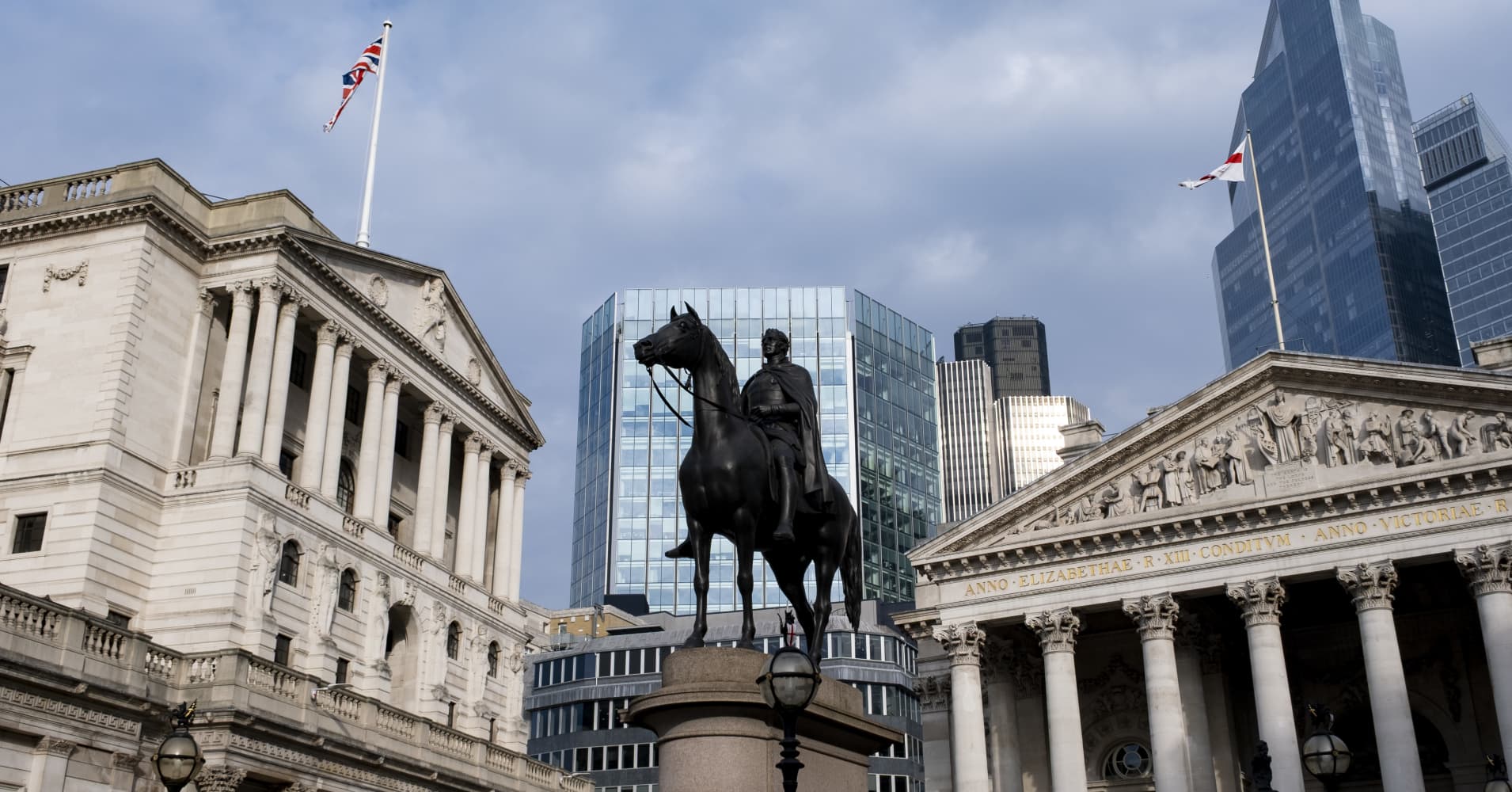Featured
- Get link
- X
- Other Apps
Bank of England Keeps Rates Steady Amid Intensified Global Trade Uncertainty
- On Thursday, the Bank of England decided to keep interest rates steady, maintaining the official bank rate at 4.5%.
- In a statement, the central bank announced that its Monetary Policy Committee decided to keep interest rates unchanged with an 8-1 majority vote.
- The decision had been widely anticipated by markets.

The Bank of England left interest rates unchanged Thursday as the U.K. economy contends with uncertainty around global trade and looming stagnation at home.
The much-anticipated decision maintains the central bank's key interest rate at 4.5%.
The central bank stated in a release that the Monetary Policy Committee decided to keep interest rates steady with an 8-1 majority vote. Only one member of the committee supported decreasing rates by 25 basis points.
"As stated since the MPC’s earlier gathering, global trade policy ambiguity has escalated, with the United States announcing various tariffs; subsequently, certain administrations have retaliated,” the document read.
Various geopolitical instabilities have become more pronounced, and signs of heightened global financial market volatility have emerged as well.
Paul Dales, the U.K. chief economist at Capital Economics, stated in a report that the Bank of England would “continue with its alternating approach of cutting and holding interest rates” by keeping them at 4.50%. However, he noted that contrary to expectations from the previous meeting in February, this time around the decision showed a more hawkish stance than anticipated.
When the central bank last left rates unchanged in December, three MPC members had voted for a consecutive cut, compared to just one endorsing a trim now, he pointed out.
Uncertain headwinds
This choice arrives amid anticipated economic challenges both internationally and domestically. On a worldwide scale, it encompasses the constant changes, uncertainties, and disputes related to U.S. President Donald Trump's trade tariffs, as well as their possible effects on U.K. inflation and economic expansion.
The UK economy has exhibited indications of decline, shrinking by 0.1% on a monthly basis in January.
The BOE in February reduced its 2025 growth projection for the U.K. to 0.75%
On Thursday, the central bank said that recent business indicators suggested weakness in economic growth and employment intentions.
In February it had also said it was expecting Inflation is expected to momentarily increase to 3.7% during the third quarter of this year due to rising energy prices. UK inflation has risen more than anticipated to 3%. January .
Hussain Mehdi, who leads investment strategies at HSBC Asset Management, stated in a memo that the meeting posed significant difficulties for the BOE due to the unclear economic conditions.
"The recent economic figures suggest a stagflationary environment, which puts the MPC in a position where they must weigh inflation concerns against potential decreases in growth and shaky consumer confidence. Currently, the discussion appears to be more focused on inflation, as evidenced by only one MPC member supporting a reduction," he explained.
"However, moving forward, the MPC might become more responsive to growth figures because high levels of international policy ambiguity along with fragile confidence could pose a threat of an unexpectedly severe economic decline, particularly given the constrained fiscal space available," Mehdi noted.
More cuts ahead?
Moving ahead, the central bank stated that, according to its long-term projections for inflation, "a measured and cautious strategy towards removing additional monetary policy constraints is fitting."
Nevertheless, the BOE indicated that this would hinge on how the economy progresses moving ahead.
"If there should be increased or more prolonged weakness in demand compared to supply, this might reduce inflationary pressure, suggesting a less tight sequence of increases in the Bank Rate would be appropriate," the statement read.
If there is a more restricted supply compared to demand and greater persistence in domestic wages and prices, including secondary round effects tied to the upcoming rise in CPI inflation, this would necessitate a comparatively tighter trajectory for monetary policy.
On Thursday, Capital Economics' Dales mentioned that although there were some dovish alterations to the wording of the BOE statement, these were overshadowed by newer, more hawkish sentiments.
"What this means is that there seems to be less enthusiasm for accelerating rate cuts and more of a preference to maintain the present pace of reductions, if anything," he stated.
Following the decision, the British pound had fallen 0.3% compared to the dollar by 12:28 PM in London.
In the meantime, the yields on British government bonds, referred to as gilts, moved slightly downwards. The yield on 10-year gilts was recently more than four basis points lower.
The meeting scheduled for Thursday takes place mere days prior to the implementation of new UK government taxes that have stirred significant discontent among businesses. These companies argue that increasing tax burdens might undermine economic expansion, hinder investments, and jeopardize job creation.
The UK Treasury's "Spring Statement," where Finance Minister Rachel Reeves will provide updates on her strategies for the British economy, is scheduled for March 26. She faces the challenge of either reducing public expenditure, increasing taxation further, or adjusting the government’s predefined financial guidelines due to elevated borrowing expenses.
— Holly Ellyatt and Chloe Taylor from NewsBlog provided contributions for this report.
- Get link
- X
- Other Apps
Popular Posts
Unmasking Misinformation: Journalist’s Quest for Verified Truth (International Edition)
- Get link
- X
- Other Apps
PTA Clarifies: X Disruption (Formerly Twitter) Unrelated to Local Internet Filtering – International Edition
- Get link
- X
- Other Apps
Comments
Post a Comment